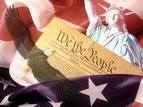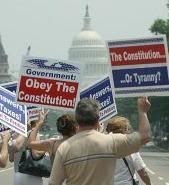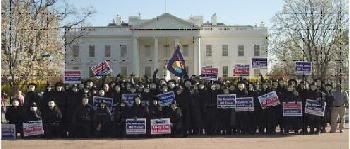From The Reader Comments
Not all Judges are Bad... Most are Respectfull, and Believe in the Constitution.
Some However, along with IRS Employees, and People Like JOEY... Think they have the Power to walk around and Randomly point out INNOCENT Citizens, Label Them, Persecute Them, Try, Convict, Sentence, and Theive from Them... Without DUE PROCESS, or PROSECUTION BY A JURY... In essence... Without a Trial at all.
"A HOLLYWOOD JURY IS NOT... A JURY."
THINK ABOUT THIS A MOMENT...
If Every One of Us could walk around... Point a finger at our Neighbors... And Charge, Try and Convict Them... Without Providing a Jury with Evidence to Prove Our Neighbor Even Committed a Crime... And without ever even showing up to Court!... What Kind of Country Would We Live In!
I'll Tell You... We'd Live in a Country with very Few Local Neighbors, and if Lucky, Corrupt or Blind, You and your Neighbors will all own a portion of what You Inherited from those You've Jailed... Or will be Jailed yourselves. When all the "CROOKED FINGER POINTING" is done... What you have left is a Few POWERFUL PEOPLE, Controling a POWERFUL ARMY, And an Enslaved Nation.
Take a look around at your Neighbors folks... Who I ask... Might be Pointing their Crooked finger at you.
If You’re the average American Citizen…. And not the Judge, Irs Agent, or Congressmen… I can tell you Exactly where the Perverbial Finger Points. It Points to WE THE PEOPLE, Like we’re witches to be Burned at the stake.
Now… If you Present the Constitution, and the Written Law, into the Face of the Average American Citizen, the Judge, and the IRS… The Straight Finger if Justice Points Directly at them, and to their Lies, and to their theft of YOUR Labors.
From the reader comments here.












11 Comments:
This is right out of the NH STATE CONSTITUTION:
[Art.] 8. [Accountability of Magistrates and Officers; Public’s Right to Know.] All power residing originally in, and being derived from, the people, all the magistrates and officers of government are their substitutes and agents, and at all times accountable to them. Government, therefore, should be open, accessible, accountable and responsive. To that end, the public’s right of access to governmental proceedings and records shall not be unreasonably restricted.
June 2, 1784
Amended 1976 by providing right of access to governmental proceedings and records.
I Invite Judge McAuliffe to Respond...
I Motion for Judge to Respond...
hmmm...
This Judge just doesn't like to respond...
Should WE THE PEOPLE pull up his Robe and see if there's A Judge there at all?!
[Art.] 10. [Right of Revolution.] Government being instituted for the common benefit, protection, and security, of the whole community, and not for the private interest or emolument of any one man, family, or class of men; therefore, whenever the ends of government are perverted, and public liberty manifestly endangered, and all other means of redress are ineffectual, the people may, and of right ought to reform the old, or establish a new government. The doctrine of nonresistance against arbitrary power, and oppression, is absurd, slavish, and destructive of the good and happiness of mankind.
June 2, 1784
More State Constitution:
Hope you're seeing this ED.
[Art.] 12. [Protection and Taxation Reciprocal.] Every member of the community has a right to be protected by it, in the enjoyment of his life, liberty, and property; he is therefore bound to contribute his share in the expense of such protection, and to yield his personal service when necessary. But no part of a man’s property shall be taken from him, or applied to public uses, without his own consent, or that of the representative body of the people. Nor are the inhabitants of this state controllable by any other laws than those to which they, or their representative body, have given their consent.
June 2, 1784
Amended 1964 by striking out reference to buying one’s way out of military service.
[Art.] 13. [Conscientious Objectors not Compelled to Bear Arms.] No person, who is conscientiously scrupulous about the lawfulness of bearing arms, shall be compelled thereto.
June 2, 1784
Amended 1964 by striking out reference to buying one’s way out of military service.
[Art.] 14. [Legal Remedies to be Free, Complete, and Prompt.] Every subject of this state is entitled to a certain remedy, by having recourse to the laws, for all injuries he may receive in his person, property, or character; to obtain right and justice freely, without being obliged to purchase it; completely, and without any denial; promptly, and without delay; conformably to the laws.
June 2, 1784
[Art.] 15. [Right of Accused.] No subject shall be held to answer for any crime, or offense, until the same is fully and plainly, substantially and formally, described to him; or be compelled to accuse or furnish evidence against himself. Every subject shall have a right to produce all proofs that may be favorable to himself; to meet the witnesses against him face to face, and to be fully heard in his defense, by himself, and counsel. No subject shall be arrested, imprisoned, despoiled, or deprived of his property, immunities, or privileges, put out of the protection of the law, exiled or deprived of his life, liberty, or estate, but by the judgment of his peers, or the law of the land; provided that, in any proceeding to commit a person acquitted of a criminal charge by reason of insanity, due process shall require that clear and convincing evidence that the person is potentially dangerous to himself or to others and that the person suffers from a mental disorder must be established. Every person held to answer in any crime or offense punishable by deprivation of liberty shall have the right to counsel at the expense of the state if need is shown; this right he is at liberty to waive, but only after the matter has been thoroughly explained by the court.
June 2, 1784
Amended 1966 to provide the right to counsel at state expense if the need is shown.
Amended 1984 reducing legal requirement proof beyond a reasonable doubt to clear and convincing evidence in insanity hearings.
ED and ELAINE have been "put out of the protection of the law" and this is simply Un-Constitutional!
[Art.] 18. [Penalties to be Proportioned to Offenses; True Design of Punishment.] All penalties ought to be proportioned to the nature of the offense. No wise legislature will affix the same punishment to the crimes of theft, forgery , and the like, which they do to those of murder and treason. Where the same undistinguishing severity is exerted against all offenses, the people are led to forget the real distinction in the crimes themselves, and to commit the most flagrant with as little compunction as they do the lightest offenses. For the same reason a multitude of sanguinary laws is both impolitic and unjust. The true design of all punishments being to reform, not to exterminate mankind.
June 2, 1784
Amended 1792 deleting "those of" after do in 3d sentence and changing "dye" to: offenses.
[Art.] 19. [Searches and Seizures Regulated.] Every subject hath a right to be secure from all unreasonable searches and seizures of his person, his houses, his papers, and all his possessions. Therefore, all warrants to search suspected places, or arrest a person for examination or trial in prosecutions for criminal matters, are contrary to this right, if the cause or foundation of them be not previously supported by oath or affirmation; and if the order, in a warrant to a civil officer, to make search in suspected places, or to arrest one or more suspected persons or to seize their property, be not accompanied with a special designation of the persons or objects of search, arrest, or seizure; and no warrant ought to be issued; but in cases and with the formalities, prescribed by law.
June 2, 1784
Amended 1792 to change order of words.
``````[Art.] 20. [Jury Trial in Civil Causes.] In all controversies concerning property, and in all suits between two or more persons except those in which another practice is and has been customary and except those in which the value in controversy does not exceed $1,500 and no title to real estate is involved, the parties have a right to a trial by jury. This method of procedure shall be held sacred, unless, in cases* arising on the high seas and in cases relating to mariners’ wages, the legislature shall think it necessary hereafter to alter it.
June 2, 1784
Amended in 1877 to prohibit jury trials unless the amount in controversy exceeds $l00.
Amended in 1960 to increase the amount to $500 before a jury trial may be requested.
*"Cases" appears in 1792 parchment copy of constitution. Original constitution had "causes." Amended in 1988 to change $500 to $1,500
[Art.] 21. [Jurors; Compensation.] In order to reap the fullest advantage of the inestimable privilege of the trial by jury, great care ought to be taken, that none but qualified persons should be appointed to serve; and such ought to be fully compensated for their travel, time and attendance.
June 2, 1784
[Art.] 22. [Free Speech; Liberty of the Press.] Free speech and liberty of the press are essential to the security of freedom in a state: They ought, therefore, to be inviolably preserved.
June 2, 1784
Amended 1968 to include free speech.
[Art.] 23. [Retrospective Laws Prohibited.] Retrospective laws are highly injurious, oppressive, and unjust. No such laws, therefore, should be made, either for the decision of civil causes, or the punishment of offenses.
June 2, 1784
[Art.] 24. [Militia.] A well regulated militia is the proper, natural, and sure defense, of a state.
June 2, 1784
[Art.] 25. [Standing Armies.] Standing armies are dangerous to liberty, and ought not to be raised, or kept up, without the consent of the legislature.
June 2, 1784
[Art.] 26. [Military Subject to Civil Power.] In all cases, and at all times, the military ought to be under strict subordination to, and governed by, the civil power.
June 2, 1784
[Art.] 27. [Quartering of Soldiers.] No soldier in time of peace, shall be quartered in any house, without the consent of the owner; and in time of war, such quarters ought not to be made but by the civil authorities in a manner ordained by the legislature.
June 2, 1784
Amended in 1980 substituting "authorities" for "magistrate."
[Art.] 28. [Taxes, by Whom Levied.] No subsidy, charge, tax, impost, or duty, shall be established, fixed, laid, or levied, under any pretext whatsoever, without the consent of the people, or their representatives in the legislature, or authority derived from that body.
June 2, 1784
[Art.] 28-a. [Mandated Programs.] The state shall not mandate or assign any new, expanded or modified programs or responsibilities to any political subdivision in such a way as to necessitate additional local expenditures by the political subdivision unless such programs or responsibilities are fully funded by the state or unless such programs or responsibilities are approved for funding by a vote of the local legislative body of the political subdivision.
November 28, 1984
[Art.] 29. [Suspension of Laws by Legislature Only.] The power of suspending the laws, or the execution of them, ought never to be exercised but by the legislature, or by authority derived therefrom, to be exercised in such particular cases only as the legislature shall expressly provide for.
June 2, 1784
[Art.] 30. [Freedom of Speech.] The freedom of deliberation, speech, and debate, in either house of the legislature, is so essential to the rights of the people, that it cannot be the foundation of any action, complaint, or prosecution, in any other court or place whatsoever.
June 2, 1784
[Art.] 31. [Meetings of Legislature, for What Purposes.] The legislature shall assemble for the redress of public grievances and for making such laws as the public good may require.
June 2, 1784
Amended 1792 generally rewording sentence and omitting "for correcting, strengthening and confirming the laws."
[Art.] 32. [Rights of Assembly, Instruction, and Petition.] The people have a right, in an orderly and peaceable manner, to assemble and consult upon the common good, give instructions to their representatives, and to request of the legislative body, by way of petition or remonstrance, redress of the wrongs done them, and of the grievances they suffer.
June 2, 1784
[Art.] 33. [Excessive Bail, Fines, and Punishments Prohibited.] No magistrate, or court of law, shall demand excessive bail or sureties, impose excessive fines, or inflict cruel or unusual punishments.
June 2, 1784
[Art.] 34. [Martial Law Limited.] No person can, in any case, be subjected to law martial, or to any pains or penalties by virtue of that law, except those employed in the army or navy, and except the militia in actual service, but by authority of the legislature.
June 2, 1784
[Art.] 35. [The Judiciary; Tenure of Office, etc.] It is essential to the preservation of the rights of every individual, his life, liberty, property, and character, that there be an impartial interpretation of the laws, and administration of justice. It is the right of every citizen to be tried by judges as impartial as the lot of humanity will admit. It is therefore not only the best policy, but for the security of the rights of the people, that the judges of the supreme judicial court should hold their offices so long as they behave well; subject, however, to such limitations, on account of age, as may be provided by the constitution of the state; and that they should have honorable salaries, ascertained and established by standing laws.
June 2, 1784
Amended 1792 to provide for age limitation as provided by the constitution.
[Art.] 2l. [Privileges of Members of Legislature.] No member of the house of representatives, or senate shall be arrested, or held to bail, on mesne process, during his going to, returning from, or attendance upon, the court.
[Art.] 23. [Senate and Executive Have Like Powers; Imprisonment Limited.] The senate, governor and council, shall have the same powers in like cases; provided, that no imprisonment by either, for any offense, exceeds ten days.
Art.] 41. [Governor, Supreme Executive Magistrate.] There shall be a supreme executive magistrate, who shall be styled the Governor of the State of New Hampshire, and whose title shall be His Excellency. The executive power of the state is vested in the governor. The governor shall be responsible for the faithful execution of the laws. He may, by appropriate court action or proceeding brought in the name of the state, enforce compliance with any constitutional or legislative mandate, or restrain violation of any constitutional or legislative power, duty, or right, by any officer, department or agency of the state. This authority shall not be construed to authorize any action or proceedings against the legislative or judicial branches.
[Art.] 56. [Disbursements from Treasury.] No moneys shall be issued out of the treasury of this state, and disposed of, (except such sums as may be appropriated for the redemption of bills of credit, or treasurer´s notes, or for the payment of interest arising thereon) but by warrant under the hand of the governor for the time being, by and with the advice and consent of the council, for the necessary support and defense of this state, and for the necessary protection and preservation of the inhabitants thereof, agreeably to the acts and resolves of the general court.
[Art.] 63. [Impeachment of Councilors.] The members of the council may be impeached by the house, and tried by the senate for bribery, corruption, malpractice, or maladministration.
June 2, 1784
Amended 1792 changing wording generally and changing mal-conduct to bribery, corruption, malpractice, or maladministration.
[Art.] 64. [Secretary to Record Proceedings of Council.] The resolutions and advice of the council shall be recorded by the secretary, in a register, and signed by all members present agreeing thereto; and this record may be called for at any time, by either house of the legislature; and any member of the council may enter his opinion contrary to the resolutions of the majority, with the reasons for such opinion.
State Constitution > Judiciary Power
ESTABLISHED OCTOBER 31, 1783 TO TAKE EFFECT JUNE 2, 1784 AS SUBSEQUENTLY AMENDED AND IN FORCE DECEMBER 1990
[Art.] 73. [Tenure of Office To Be Expressed in Commissions; Judges to Hold Office During Good Behavior, etc.; Removal.] The tenure that all commissioned officers shall have by law in their offices shall be expressed in their respective commissions, and all judicial officers duly appointed, commissioned and sworn, shall hold their offices during good behavior except those for whom a different provision is made in this constitution. The governor with consent of the council may remove any commissioned officer for reasonable cause upon the address of both houses of the legislature, provided nevertheless that the cause for removal shall be stated fully and substantially in the address and shall not be a cause which is a sufficient ground for impeachment, and provided further that no officer shall be so removed unless he shall have had an opportunity to be heard in his defense by a joint committee of both houses of the legislature.
June 2, 1784
Amended 1792 changing president to governor.
Amended 1966 spelling out procedures for removal from office
[Art.] 73-a. [Supreme Court, Administration.] The chief justice of the supreme court shall be the administrative head of all the courts. He shall, with the concurrence of a majority of the supreme court justices, make rules governing the administration of all courts in the state and the practice and procedure to be followed in all such courts. The rules so promulgated shall have the force and effect of law.
November 22, 1978
[Art.] 74. [Judges to Give Opinions, When.] Each branch of the legislature as well as the governor and council shall have authority to require the opinions of the justices of the supreme court upon important questions of law and upon solemn occasions.
June 2, 1784
Amended 1792 changing president to governor.
Amended 1958 substituting supreme court for superior court.
[Art.] 77. [Jurisdiction of Justices in Civil Causes.] The general court are empowered to give to justices of the peace jurisdiction in civil causes, when the damages demanded shall not exceed one hundred dollars and title of real estate is not concerned; but with right of appeal, to either party, to some other court. And the general court are further empowered to give to police courts original jurisdiction to try and determine, subject to right of appeal and trial by jury, all criminal causes wherein the punishment is less than imprisonment in the state prison.
September 5, 1792
Amended 1877 substituting $100 for 4 pounds
Amended 1912 giving jurisdiction to police courts.
[Art.] 84. [Oath of Civil Officers.] Any person chosen governor, councilor, senator, or representative, military or civil officer, (town officers excepted) accepting the trust, shall, before he proceeds to execute the duties of his office, make and subscribe the following declaration, viz. -
I, A.B. do solemnly swear, that I will bear faith and true allegiance to the United States of America and the state of New Hampshire, and will support the constitution thereof. So help me God.
I, A.B. do solemnly and sincerely swear and affirm that I will faithfully and impartially discharge and perform all duties incumbent on me as ................................................., according to the best of my abilities, agreeably to the rules and regulations of this constitution and laws of the state of New Hampshire. So help me God.
Any person having taken and subscribed the oath of allegiance, and the same being filed in the secretary's office, he shall not be obliged to take said oath again.
Provided always, when any person chosen or appointed as aforesaid shall be of the denomination called Quakers, or shall be scrupulous of swearing, and shall decline taking the said oaths, such person shall take and subscribe them, omitting the word "swear," and likewise the words "So help me God," subjoining instead thereof, "This I do under the pains and penalties of perjury."
I, A.B., do solemnly and sincerely swear and affirm, that I will faithfully and impartially discharge and perform all the duties incumbent on me as....................according to the best of my abilities, agreeably to the rules and regulations of this constitution, and the laws of the State of New Hampshire. So help me God.
June 2, 1784
Amended 1792 three times, changing president to governor; shortening oath of allegiance; and dispensing with need to take second oath.
Amended 1970 adding allegiance to the United States of America.
[Art.] 85. [Before Whom Taken.] The oaths or affirmations shall be taken and subscribed by the governor before a justice of a New Hampshire court, in the presence of both houses of the legislature, by the senators and representatives before the governor and council for the time being, and by all other officers before such persons and in such manner as the general court shall from time to time appoint.
June 2, 1784
Amended 1792 three times changing president to governor, senior senator to president of the senate, assembly to legislature, and generally rewording section.
Amended 1968 deleting reference to those first elected.
Amended 1984 providing that the governor’s oath shall be taken before a justice of a New Hampshire court.
[Art.] 86. [Form of Commissions.] All commissions shall be in the name of the state of New Hampshire, signed by the governor, and attested by the secretary, or his deputy, and shall have the great seal of the state affixed thereto.
June 2, 1784
Amended 1792 changing president to governor.
[Art.] 87. [Form of Writs.] All writs issuing out of the clerk's office in any of the courts of law, shall be in the name of the state of New Hampshire; shall be under the seal of the court whence they issue, and bear test of the chief, first, or senior justice of the court; but when such justice shall be interested, then the writ shall bear test of some other justice of the court, to which the same shall be returnable; and be signed by the clerk of such court.
June 2, 1784
[Art.] 88. [Form of Indictments, etc.] All indictments, presentments, and informations, shall conclude, "against the peace and dignity of the state."
[Art.] 93. [Governor and Judges Prohibited From Holding Other Offices.] No governor, or judge of the supreme judicial court, shall hold any office or place under the authority of this state, except such as by this constitution they are admitted to hold, saving that the judges of the said court may hold the offices of justice of the peace throughout the state; nor shall they hold any place or office, or receive any pension or salary, from any other state, government, or power, whatever.
June 2, 1784
Amended 1792 changing president to governor. The engrossed copy of 1792, apparently without authority, changed superior court to supreme judicial court.
Let's start a Petition, and get Thousands of Signatures from NH Residents, All Demanding to Overturn The Brown's Conviction, and to Charge Judge McAuliffe with not Upholding The Constitution, and WILLFULLY VIOLATING it.
Care to Rebut? Joey?
Post a Comment
Subscribe to Post Comments [Atom]
<< Home